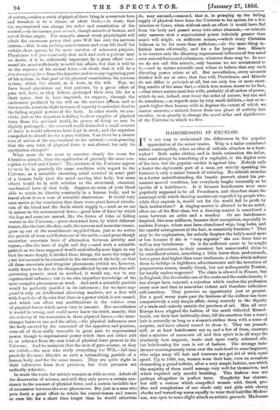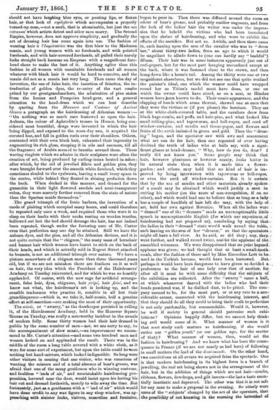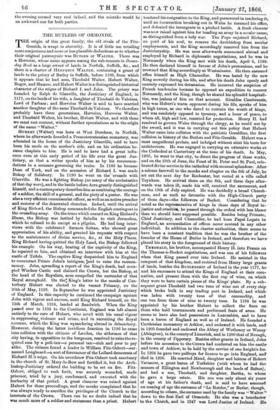HAIRDRESSING IN EXCELSIS.
I T is not easy to understand the differences in the popular
appreciation of the minor trades. Why is a tailor considered rather contemptible, when no idea of ridicule attaches to a boot- maker ? Both make clothes, and in trade estimation the tailor, who must always be something of a capitalist, is the higher man of the two, but the popular verdict is against him. Nobody calls a hosier the eighteenth part of a man, yet strictly speaking his business is only a minor branch of tailoring. No ridicule attaches to a hatter notwithstanding, the lunatic proverb about his per- manent mental condition, but everybody laughs internally as he speaks of a hairdresser. Is it because hairdressers were once popularly supposed to be all Frenchmen, and therefore share the contempt with which dancing-masters are regarded by people who, while they express it, would not for the world fail to profit by their instructions? A singing-master is allowed to be an artist, often one of the first -class, but a dancing-master is considered a cross between an artist and a monkey. Or are hairdressers despised, like men milliners, because their occupation,pecially in modern Europe, where men have abandoned wigs, long locks, and the careful arrangement of the hair, is essentially feminine ? That may be the explanation, for nobody despises the lady's-maid more or less because if she is "very superior" she can dress hair as well as any hairdresser. Or is the sufficient cause to be sought in their pretensions, in their constant but unsuccessful claim to be considered artists, something a little lower than professionals, but a great deal higher than mere tradesmen, a claim-which induces them to indulge in highflown advertisements and the invention of preposterous names, usually Greek, but not unfrequently Persian, for totally useless unguents? The claim is allowed in France, but in England, like the similar one of the cooks and the confectioners, it has always been rejected, a rejection which excites the profession every now and then to somewhat violent and therefore ridiculous self-assertion. They perceive an opportunity just at present. For a good many years past the business of the coiffeur has been comparatively a very simple affair, rising scarcely to the dignity of a trade and entirely outside the province of art. Men all over Europe have adeted the fashion of the much ridiculed Round- heads, cut their hair habitually close, till the assertion that a man's hair is nattuelly as long as a woman's strikes them with a sense of surprise, and have almost ceased to dress it. They use pomade still, or at least hairdressers say so, and a few of them, unaware that a mixture of cocoa-nut oil and thin spirit is in all ways the absolutely best unguent, waste cash upon costly coloured oils, but hairdressing for men is out of fashion. The average hair- dresser contemptuously turns over the male bead to some beginner, who snips away till hair and tournure are got rid of with equal speed. Up to 1860, too, women wore their hair, even on occasions demanding a grand toilette, after a very simple fashion, one which the majority of them could manage very well for themselves, and which required only careful brushing. This fashion was not perhaps altogether in perfect taste. Simplicity has charms, but still a custom which compelled women with Greek pro- files and complexions of one shade only and girls with cherry cheeks and turned-up noses equally to wear their hairlike Medea- ems, was open to some slight attack on artistic grounds. "Madonnas should not have laughing blue eyes, or pouting lips, or flaxen hair, or that look of espaglerie which accompanies a properly turned-up nose,—not a snub, that is abominable, but just the nez retrousse which artists detest and other men marry. The Second Empire, however, does not approve simplicity, and gradually the art of dressing hair has come again into use. The fashion of wearing hair a 1' implratrice was the first blow to the Madonna mania, and young women with no foreheads, and with pointed foreheads, and with hair-covered foreheads, all pulled their unruly locks straight back because an Empress with a magnificent fare- head chose to make the best of it. Anything uglier than this fashion in all women with unsuitable foreheads and all women whatever with black hair it would be hard to conceive, and the mania did not as a mania last very long. Then came the day of invention, the use of false hair, the insertion of frisettes, the in- troduction of golden dyes, the re-entry of the vast combs prized by our greatgrandmothera, the admiration of pins stolen from the Ionian and Pompeian head-gear, and a general attention to the head-dress which we can beat describe by quieting from the Manners and Customs of Ancient Greece a paragraph on the hairdressing of Athenian women :- 46 On nothing was so much care bestowed as upon the hair. Auburn, the colour of Aphrodite's tresses in Homer, being con- sidered most beautiful, drugs were invented in which the hair being dipped, and exposed to the, noon day sun, it acquired the ■ coyeted hue, and fell in golden curls over their shoulders. Others, contented with their own black hair, exhausted their ingenuity in augmenting its rich gloss, steeping it in oils and essences, till all the fragrance, of Arabia seemed to breathe around them. Those waving ringlets which we admire in their sculpture were often the -creation of art, being produced by curling-irons heated iu ashes ; after which, by the aid of jewelled fillets and golden pins, they were brought forward over the smooth white forehead, which they :sometimes shaded to the eyebrows, leaving a small ivory space in the centre, while behind they floated in shining profusion down the back. When decked in this manner, and dressed for the _gunsecitis in their light flowered sandals and semi-transparent robes, they were scarcely farther removed from the state of nature than the Spartan maids themselves."
The grand triumph of the Ionic barbers, the invention of a mode of plaiting which occupied many hours, and could therefore be repeated only once a week, and required those who wore it to -sleep on their backs with their necks resting on wooden trestles, 'hollowed out lest the bed. should derange the hair, has not indeed been repeated, though under the fostering care of Mr. Carter -even that perfection may one day be attained. Still we have the auburn dyes, and the pins, and all the Athenian devices, and it is not quite certain that the " chignon," the nasty mass of horsehair and human hair which women have learnt to stick on the back of &their heads, and which is actually sold in Regent Street attached to bonnets, is not an additional triumph over nature. We have a picture. somewhere of a chignon more than three thousand years old, but if we are not mistaken there are feathers on it as well :as hair, the very idea which the President of the Hairdressers' Academy on Tuesday reinvented, and for which he was so heartily applauded. Of course, with the new rage for artificial arrange- ment, false hair, dyes, chignons, hair crepe, hair frise, and we know not what, the hairdresser's art is looking up, and the sensible tradesmen who practise it, sensible in all but their grandiloquence—svhich is, we take it, half-comic, half a genuine effort at self-assertion-,are making the most of their -opportunity.
The soirée, or " awarry," as the doorkeeper persisted in calling it, of the Hairdressers' Academy, held in the Hanover Square 'Rooms on Tuesday, was really a noteworthy incident in the annals -of modern folly. Some thirty women had their hair dressed in public by the same number of men—not, we are sorry to say, to the accompaniment of slow music,—an improvement we recom- mend to Mr. Carter's attention—and some two hundred men and women looked on and applauded the result. There was in the middle of the room a Ion table covered with a white cloth, as it -were for some sort of experiment, but upon the table could be sseen nothing but hand-mirrors, which looked indigestible. So long were other visitors in coming that one visitor, who was conscious of wanting the scissors and of a total absence of bear's grease, was afraid that one of the many gentlemen who in winning costume, and faultless " 'eads of air," and unmistakable hairdressing pro- pensities, hovered near the door, would insist upon his having his hair cut and dressed forthwith, merely to wile away the time. But fortunately, jut as a gentleman with a "'sad of air" which would have done credit to any wax figure in any shop window, was ap- proaching with siuister looks, visitors, masculine and feminine, began to pour in. Then there was diffused around the room an odour of bear's grease, and probably costlier unguents, and from the look of the ladies' hair the writer was under the impres- sion that he beheld the victims who had been immolated upon the shrine of hairdressing, and who were to exhibit the effects of the sacrifice. But not so. Awhile, and then there came in, each leaning upon the arm of the cavalier who was to ':dress her," about thirty-two ladles, from an age to which it would be ungallant to allude down to (one can hardly say " bashful") fifteen. Their hair was in some instances apparently just out of curl-papers, but for the most part hanging unconfined except at the back, where it was fastened close to the crown, and then hung down like a horse's tail. Among the thirty were one or two magnificent chevelures, but we did not see one that quite realized the painter's ideal, one which the wearer could have wrapped round her as Titian's model must have done, or one on which the owner could have stood, as on a mat, as Hindoo women have been known to do. Their comic appearance, and the clapping of hands which arose thereat, showed one at once that they were the victims or (if you please) the heroines. They sat at the white-cloth-covered table, and the cavaliers drew from black bags combs, and puffs, and hair-pins, and what looked like small rolling-pins, and tapeworms, and bell-ropes, and cord off window-curtains, and muslin and tissue-paper, and flowers and fruits of the earth imitated in green and gold. Then the "dress- ing " began, and the spectator saw with awe and amazement what art can do for hair, thee one repented of ever having doubted the truth of ladies who at balls say, with a signi- ficant glance at head-dreams, " Why, how do you do, dear? I really did not know you." Some people may think that hair, however plenteous, or however scanty, looks batter in its natural state than when it is made into a flower- garden ; and others may hold that no kind of hair is im- proved by Whiz interwoven with tapeworms or bell-ropes, or even the cord off window-curtains. But it is certain that by the use of muslin and other materials. already spoken of a result may be obtained which would justify a man in cutting his mother (on the score of non-recognition, if on I10 other), and which would lead one to believe that so long as a lady has a couple of handfuls of hair left she may, with the help of art, hold her own against Bereaioe. When alt the ladies were " dressed " one of the dressers " made an unexceptionable hitS1e.. speech in unexceptionable English (for which our mtparienee,..of hairdressing had not prepared us), concluding by saying that.. the ladies in their 6' dremed " state would walk round the table, each leaning on the arm of her "dresser," so that the spectators might all have a full view. As he said, so did they ; nay, they went further, and walked round twice, amidst the applause of the assembled witnesses. We were disappointed that no prize beyond. applause was given; we had thought .that at least a, smal:teoth, comb, after the fashion of those said by Miss Emmeline Lott to be used in the Turkish harems, would have been bestowed. Bub perhaps it would have been dangerous to have given so decided a , preference to the hair of one lady over, that of another, for after all it must be with some difficulty that the altbjecte of the exhibition are collected. After the " awarry " came a ball, at which whosoever danced with the ladies who had their heads powdered was, if he disliked dust, to be pitied. The com- pany seemed to be, for the most part, or at any rate to a con- siderable extent, connected with the hairdressing interest, end that they should do all they could to bring their craft to perfection is not only pardonable, but commendable. Would it, however, be well if society in general shOuld patronize such exhi- bitions? Opinions happily differ, but we cannot help think- ing evil would come of it. What manner of woman is it that must study such matters as hairdressing, if she would entice our " golden youth" (or our golden age, for the matter of that) ? What manner of woman, then, would set the fashion in hairdressing ? And we know what has been the conse- quence in France (if we are not nearly as bad here) of following in small matters the lead of the de»ai-monde. On the other hand, two convictions at all events we acquired from the spectacle. One is that modern hairdressing in its highest form is a branch of jewelling, the real art being shown not in the arrangement of the hair, but in the addition of things which are not hair—ember ribbons, flowers, dewdrops, and gilt insects—the last a taste essen- tially inartistic and depraved. The other was that Rip not safe for any man to snake a proposal in the evening, So utterly were some of the " subjects" changed by the act of the operators, that the possibility of lint knowing in the imarang the betrothed of
the evening seemed very real indeed, and the mistake would be an awkward one for both parties.




































 Previous page
Previous page